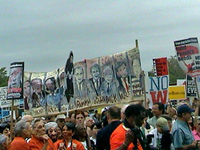U.S. peace activists denied access into Canada

FBI-run database says that two U.S. peace activist previously arrested for protesting the Iraq war are connected to terrorism and felony.
Medea Benjamin and Ann Wright's query comes after the two women were denied entry to Canada, which also relies on the National Crime Information Center database to screen visitors. When they visited Canada in August, they were told they would have to apply for "criminal rehabilitation" and pay $200 (EUR140) if they wanted to visit again. Neither did.
On Wednesday, Benjamin, co-founder of the anti-war group Code Pink, and Wright, a retired Army colonel, walked into Canada at Niagara Falls to test whether they really would be denied entry because of their anti-war-related arrests.
They were.
"We are certainly no threat to the Canadian people," Benjamin said.
Benjamin said she and Wright, who resigned as a senior diplomat at the U.S. Embassy in Mongolia in 2003, planned to protest at the Canadian embassy in Washington on Thursday and to ask the FBI to remove the protest charges from the NCIC database.
The protesters believe the inclusion of activists' names in the database is a form of political intimidation of people opposed to Bush administration policies.
FBI spokesman Paul Moskal said that while the FBI maintains the database, the data is supplied by arresting agencies and others.
John Curr III, director of the New York Civil Liberties Union in Buffalo, said that by relying on the database to screen visitors, Canada is participating in the administration's suppression of free speech.
"The Canadians accepted wholesale once you're on the list, you don't get into Canada," Wright said shortly before walking across the Rainbow Bridge into Ontario. She and Benjamin spent 2 1/2 hours in the customs inspection area before being sent back to the United States.
Derek Mellon, a spokesman with the Canada Border Services Agency, said he was unable to comment on Wright and Benjamin specifically, but said all foreign visitors must meet longstanding admissibility requirements, such as having valid travel documents and a clean criminal record.
Canada generally refuses entry to anyone who has been convicted of a criminal offense, regardless of the nature of it, he said. Those with convictions, however, may apply to be rehabilitated, which involves filing paperwork and paying a processing fee ranging from $200 (EUR140) to $1,000 (EUR700).
"We welcome millions of American visitors every year," he said.
Subscribe to Pravda.Ru Telegram channel, Facebook, RSS!




